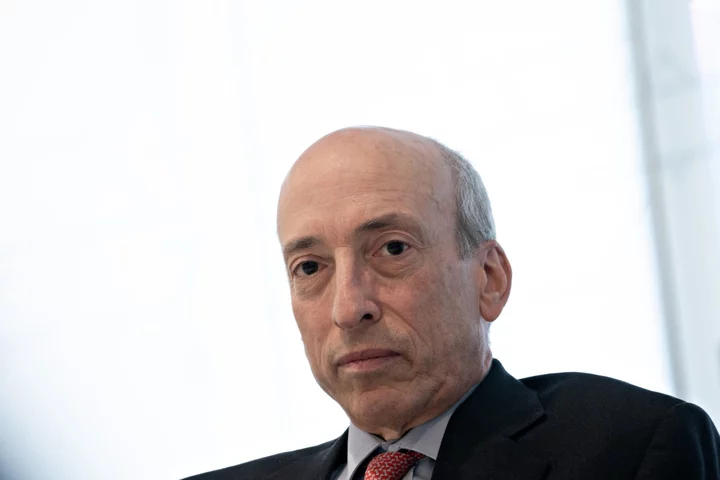Hedge funds and private equity firms are laying the groundwork for a legal clash with the US Securities and Exchange Commission over its bid to tighten rules on disclosing fees and dealing with investors.
The Managed Funds Association recently told members that the trade group could sue the SEC within two weeks of the new regulations being finalized, unless they’re softened significantly from what the agency proposed in February 2022. The email message, which was obtained by Bloomberg News, spotlights rising industry angst around a cornerstone of Chair Gary Gensler’s regulatory agenda.
As proposed, the new rules would require hedge funds and private equity firms to disclose details of what they charge investors, while blocking certain types of fee arrangements. It would also be easier for pensions and endowments to successfully sue managers over investment decisions.
Trade groups and investment firms, including Citadel and Andreessen Horowitz, have sent the SEC comments opposing the plan since the regulator released its initial proposal.
The SEC hasn’t announced a date to implement the plan, but a near-final version is now circulating between the offices of the agency’s five commissioners, according to people familiar with the status, who asked not to be identified discussing non-public matters. That typically means a final vote could come in a month, or less.
“MFA has been preparing to defend members through litigation,” the group said in its recent note to members. “As a part of MFA’s litigation strategy, we have gathered a coalition of impacted trade groups to join our potential suit against the SEC.”
The group said that suing depends on an internal approval process and whether the final version ultimately fails to blunt aspects of the plan that MFA opposed. Its members include many of the biggest hedge fund and private equity firms in the world.
The U.S. Chamber of Commerce and private equity-funded American Investment Council have spoken with the MFA and other trade groups about common concerns about the proposed rules, said people with knowledge of the discussions, who asked not be identified discussing the deliberations. Various trade groups are waiting for the final details before deciding how to mobilize.
Tom Quaadman, executive vice president for the U.S. Chamber of Commerce’s Center for Capital Markets Competitiveness, said that his organization would review the final rule before making any decisions on potential lawsuits. “In its current form, the proposal is unworkable for many private fund advisers,” he added. A representative for AIC declined to comment.
In a statement, the SEC said it “undertakes rulemaking consistent with its authorities and laws governing the administrative process.” The agency didn’t address the MFA’s plans.
Tweaks and Changes
Under the SEC’s rulemaking process, a majority of the agency’s five commissioners vote to propose regulatory changes. After taking into account comments from industry, academia, lawyers and the general public, the regulator’s staff makes tweaks and then the commission holds a second vote months or years later to finalize a version of the plan. The agency is nearing that final stage.
Since taking office in 2021, Gensler, the SEC chair, has been focused on bringing more transparency to hedge funds and private equity firms. He has also often argued that their fees are opaque, while their footprints across markets demand heightened scrutiny.
Read More: Hedge Fund 2-and-20 Fee Structure in SEC Chief’s Crosshairs
The private equity industry has ballooned in the past decade as pensions, endowments and insurers have reached further beyond stock and bond funds into more complex and illiquid investments in search of yield. Buyout firms and nonbank lenders, which grew on the back of lighter regulations than the mutual fund industry, now face more scrutiny from US financial watchdogs over how they are protecting investors and the costs of their reach.
The SEC’s 2022 proposal called for lowering the legal threshold investors must meet for successfully suing fund managers. Lawyers for the industry say that such a change would likely lead to an up-tick in litigation against fund managers.
Special Redemptions
It would also prohibit funds from giving certain investors special redemption abilities and require earlier disclosure of preferential treatment. So-called accelerated monitoring fees, which involve charging lump sums when a portfolio company is sold ahead of schedule, would be banned.
The rules, if adopted as proposed, would be the first time the SEC has used an authority it got after the financial crisis to force certain disclosures from money managers to their investors, according to Gregory Larkin, a partner at Goodwin Procter in Washington.
One of the key litigation points for private funds will be whether the SEC allows pre-existing fund arrangements to remain, said Larkin. The proposal wouldn’t have allowed that.
“Everyone is watching,” he said. “We’ve certainly said that if it’s adopted as proposed, the likelihood of litigation is super high and that creates a lot of uncertainty.”

